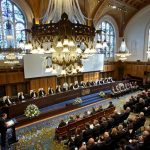
By Svetlana Marshall
Imploring the International Court of Justice (ICJ) to bar Venezuela from taking any step to seize control of the Essequibo Region through a planned referendum, Guyana through its Agent, Carl Greenidge, told the ICJ that the Court alone stands between an amicable solution to the Border Controversy between Guyana and Venezuela, and chaos in the Region.
As hearings on Guyana’s application to the Court on the Venezuelan planned referendum opened this morning, Guyana told the ICJ that it has placed its trust in the Court, and it is now for the Court to safeguard Guyana’s territorial integrity pending the outcome of the substantive case regarding the validity of the 1899 Arbitral Award.
“Guyana has not wavered in its trust in the Court. It is the only means for achieving a just, final and binding solution to the controversy between two parties in accordance with international law. The court alone stands between such a solution and chaos. Chaos that would threaten peace and security for Guyana and for the Caribbean Region and beyond,” Mr Greenidge told the ICJ.
Through a planned referendum, Venezuela is hoping to secure national support to not only reject the jurisdiction of the ICJ to resolve the controversy, but to annex Guyana’s Essequibo region, and in effect create a new Venezuelan state.
The Court heard today that Venezuela has been mobilizing its military resources near the border it shares with Guyana ahead of the referendum.

Mr Greenidge told the Court that Guyana’s right to over two-thirds of its territory is being threatened, and should Venezuela be allowed to continue, there could be irreparable injury but also permanent loss.
“What would become of Guyana’s rights to the Essequibo Region. These are the rights Guyana seeks to confirm in this case. The very rights, whose existence this court has twice affirmed it has jurisdiction to determine. Once Venezuela creates a new state, incorporating this territory, and grants Venezuelan citizenship to the population, how will this seizure of Guyana’s territory be reversed, if, in its judgement on the merits, the court rules that the 1899 Award is valid and that Guyana is the lawful sovereign. How will Venezuela’s actions be reversed, and Guyana’s rights to the territory be restored, if Venezuela rejects the court’s jurisdiction and refuses to recognise the validity of its judgement on the merits,” Guyana’s Agent submitted to the Court.
He explained to the Court that there is still time to protect the authority of the Court and to prevent Venezuela from executing the Referendum in its current form.
“As I stand before the court there is still time to protect the authority of the court and to stop Venezuela from carrying out its intended [referendum] before it secures the purported mandate to reject the court as the means of settlement of the dispute over which the court has already determined that it has jurisdiction; before it secures a purported mandate to turn Essequibo Region into the new Venezuelan State of Guayana Esequiba,” Mr Greenidge submitted.
The hearing is taking place at the Peace Palace in The Hague.
In March 2018, Guyana moved to the ICJ to confirm the validity and binding effect of the Arbitral Award of 1899, which established the boundary between the then British Guiana and Venezuela.
In the initial stage of the substantive case before the ICJ, Venezuela questioned the Court’s jurisdiction to hear and determine the border matter. The Court dismissed Venezuela’s objection and has moved ahead with the case.
The Government of Guyana has said that it has no doubt of the validity of that Arbitral Award and the land boundary, which Venezuela accepted and recognized as the international boundary for more than 60 years.
CARICOM, the OAS, and the Commonwealth have all come out in support of Guyana, and have effectively rejected the referendum, and Venezuela’s claims to Guyana’s territory.











You must be logged in to post a comment Login